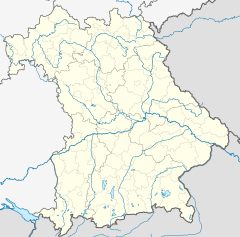Augsburg Morellstraße station
| Through station | |||||||||||||||||||||||||||||
 View of the platform | |||||||||||||||||||||||||||||
| General information | |||||||||||||||||||||||||||||
| Location | Augsburg, Bavaria Germany | ||||||||||||||||||||||||||||
| Coordinates | 48°21′19″N 10°53′35″E / 48.35528°N 10.89306°E | ||||||||||||||||||||||||||||
| Owned by | Deutsche Bahn | ||||||||||||||||||||||||||||
| Operated by | |||||||||||||||||||||||||||||
| Line(s) | |||||||||||||||||||||||||||||
| Platforms | 1 island platform | ||||||||||||||||||||||||||||
| Tracks | 2 | ||||||||||||||||||||||||||||
| Other information | |||||||||||||||||||||||||||||
| Station code | 222 | ||||||||||||||||||||||||||||
| DS100 code | MAMS[1] | ||||||||||||||||||||||||||||
| IBNR | 8000660 | ||||||||||||||||||||||||||||
| Category | 6 [2] | ||||||||||||||||||||||||||||
| Fare zone | |||||||||||||||||||||||||||||
| Website | |||||||||||||||||||||||||||||
| History | |||||||||||||||||||||||||||||
| Opened | 1847[4] | ||||||||||||||||||||||||||||
| Passengers | |||||||||||||||||||||||||||||
| < 1,000 [5] (2006) | |||||||||||||||||||||||||||||
| Services | |||||||||||||||||||||||||||||
| |||||||||||||||||||||||||||||
| |||||||||||||||||||||||||||||
Augsburg Morellstraße station is a station on the Augsburg–Buchloe railway in the German state of Bavaria. It is located south of the centre of Augsburg on the border of the districts of Antonsviertel and Hochfeld. It is a through station built with eight tracks and one island platform and is classified by Deutsche Bahn as a category 6 station.[2]
History
[edit]The station was established in September 1847 with the opening of the Augsburg–Buchloe railway and put into operation under the name of Morellstraße.[4] Augsburg was prefixed to the name on 6 October 1940.[6] After the establishment of the Augsburg Local Railway (Augsburger Localbahn) a branch was built in 1899 from Morellstraße station to Haunstetten in the local industrial area to connect to the companies of Martini & Cie, SWA and Kunstmühle Kühn.[7]
In the Second World War, a major part of the deportations from the Augsburg region to the occupied territories in eastern Europe, including to the Auschwitz concentration camp were conducted from Morellstraße station—only a few transports to Theresienstadt concentration camp ran from Augsburg Central Station (Hauptbahnhof).[8]
Infrastructure
[edit]At the station there are a total of eight through tracks. Between the third and fourth track from the east there is a central platform, which is accessible via an underpass from Von-der-Tann-Strasse.[9] The other tracks at the station were used by the Augsburger Localbahn and the link between the Hauptbahnhof and the locomotive repair shop, which today houses the Augsburg Railway Park museum and is located within walking distance.
The station is not upgraded to be accessible for the disabled.[10] The Bahnhof Augsburg Morellstraße bus stop is in Von-der-Tann-Strasse, but it is served only by rail replacement bus services.
Services
[edit]The station is not served by long-distance services. Like other small stations in Augsburg, Morellstraße is especially used for commuting to the city. The station is served by all regional trains from Augsburg Central Station towards Buchloe and in the opposite direction (some trains continue to the Allgäu). Hourly trains also stop here on the way to the Lechfeld Railway to Landsberg (Lech). Within the fare zone of the Augsburger Verkehrsverbund (Augsburg Transport Association, AVV), the regional services run as line R 7 (to Schwabmünchen) and as line R 8 (to Klosterlechfeld).[11] In the peak hour the two services produce a 15-minute interval service. The Morellstraße station is part of the planned Augsburg S-Bahn.
| Line | Route | Frequency |
|---|---|---|
| RE 71/RE 73 | Augsburg – Buchloe – Türkheim (Bay) (split) – Bad Wörishofen / – Mindelheim – Memmingen | between 8 p.m. and 7 a.m |
| RE 7/RE 17 | Augsburg – Buchloe – Biessenhofen – Kempten – Immenstadt – Lindau/Oberstdorf | between 8 p.m. and 7 a.m |
| RB 77 | Augsburg – Buchloe – Kaufbeuren – Biessenhofen – Marktoberdorf – Füssen | Hourly |
| Augsburg – Buchloe (– Kaufbeuren – Biessenhofen – Marktoberdorf) | some trains in the peak | |
| Augsburg – Bobingen (– Schwabmünchen – Buchloe) | Hourly | |
| RB 69 | Augsburg – Bobingen – Kaufering – Landsberg (Lech) | Hourly |
Notes
[edit]- ^ Eisenbahnatlas Deutschland (German railway atlas) (2009/2010 ed.). Schweers + Wall. 2009. ISBN 978-3-89494-139-0.
- ^ a b "Stationspreisliste 2024" [Station price list 2024] (PDF) (in German). DB Station&Service. 24 April 2023. Retrieved 29 November 2023.
- ^ "Tarifzonenplan Verbundraum" (PDF). Augsburger Verkehrs- und Tarifverbund. January 2020. Retrieved 2 March 2020.
- ^ a b Dumjahn, Horst-Werner (1984). Handbuch der deutschen Eisenbahnstrecken: Eröffnungsdaten 1835–1935, Streckenlängen, Konzessionen, Eigentumsverhältnisse (in German). Nachdruck: Dumjahn, Mainz. ISBN 978-3-921-42629-6.
- ^ "Brochure: Personenbahnhöfe in Bayern" (PDF) (in German). Deutsche Bahn. Archived from the original (PDF; 7.4 MB) on 22 October 2013. Retrieved 12 July 2017.
- ^ "Changes of station names in 1940" (in German). Deutsche Reichsbahn. Archived from the original on 28 September 2013. Retrieved 7 April 2013.
- ^ "Localbahn und Straßenbahn" (PDF; 2.6 MB). StadtZeitung Augsburg (in German). 28 April 2010. Retrieved 7 April 2013.
- ^ "1943" (in German). Spurensuche: Die jüdischen Schülerinnen und die Zeit des Nationalsozialismus an der Maria-Theresia-Schule Augsburg. Retrieved 7 April 2013.
- ^ "Station fact file for Augsburg Morellstraße" (in German). State of Bavaria. Retrieved 7 April 2013.
- ^ "Bahnhof Augsburg Morellstraße" (PDF) (in German). Aktion Barrierefreie Bahnhöfe in Bayern. Archived from the original (PDF; 135 kB) on 5 March 2016. Retrieved 7 April 2013.
- ^ "Lines" (in German). Augsburger Verkehrsverbund. Retrieved 7 April 2013.



